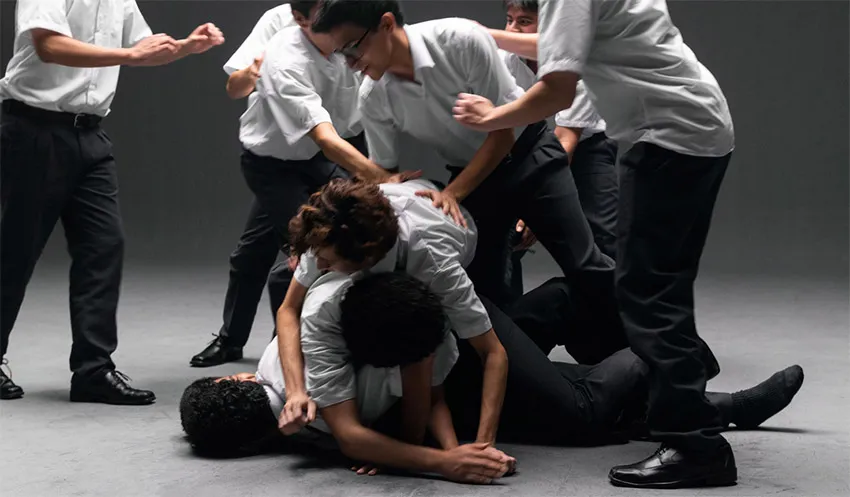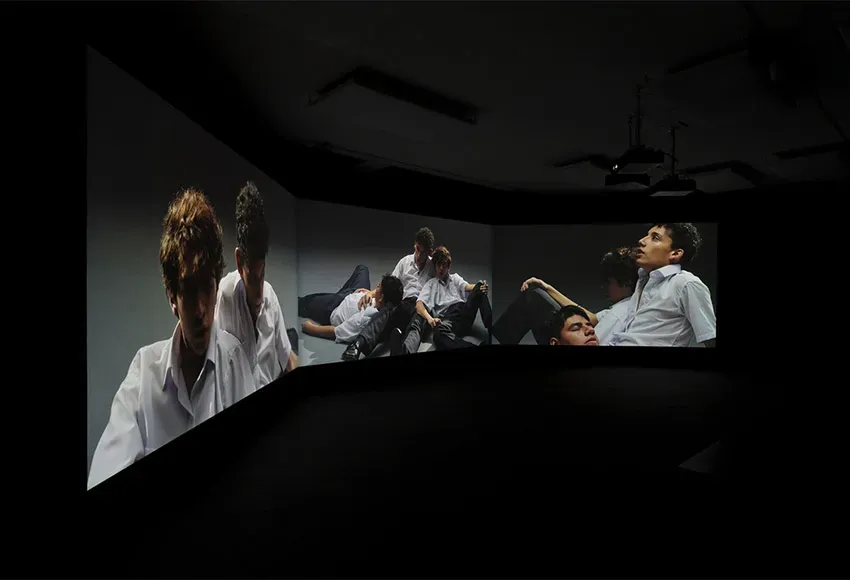For the last 20 years, Rafael Soldi has been working with mixed digital media to create art that makes people reconsider the world around them. His latest project, a collection featured at the Frye Art Museum, tackles an issue that's affected him since long before he picked up a camera.
"Soft Boy is an exhibition at the Frye Art Museum that includes three different projects that come together to talk about identity, specifically my identity as a Queer person growing up in Latin America," Soldi said. "[It navigates] a space that was pregnant with toxic masculinity and thinks about what it meant to attend an all-boys Catholic school and to navigate this set of rules and social frameworks that required you to be a certain type of man to fulfill a certain societal standard."
Soldi grew up in Peru, where the culture of machismo was present everywhere, especially on the playground. As a boy, he experienced violent coming-of-age rituals, which involved shoving, dog-piling, and other forms of physical abuse. At the time, it just seemed like the typical bullying that sensitive kids came to expect. However, as he looked back as an adult, Soldi saw the rituals as something deeper.
"I think, looking back now as an adult, that it was also used as a way for us to touch each other. It was used for us to access that kind of intimacy," he said.
Soft Boy examines how cultures of toxic masculinity hinder the upbringing of boys and what lessons they learn when they feel they can't physically express intimacy with one another. "I look at, specifically, how men are often isolated from touch, how men, especially young men growing up, are not allowed to experience intimacy with each other because it's 'Gay,'" Soldi said.
"What that creates is an environment in which we often invent violent rituals that allow us to access touch and intimacy with each other," he continued. "You see it in sports and all kinds of violent interactions and aggression. I think it's important for us to take a moment to understand the frameworks we've built for ourselves in society, to realize that they're all constructed, and to realize that we don't have to invent a contact sport to touch one another."
Soldi also found that toxic masculinity culture has even more specific effects on Queer boys who grow up with added shame around their desires for male closeness. "This, in particular, impacts young Queer people," he said. "If you are a young Queer person who is craving some intimacy with your peers – and I'm not even referring to sexual intimacy, just intimacy – and you're made to believe that you can only access that through violence, then we're telling kids that violence is a path to intimacy, and that's not true."

Magic in the darkroom
Soft Boy holds a special meaning to Soldi, who describes himself that way. He never felt like he quite fit in at his school in Peru. While other boys were roughhousing, he was always looking for a quiet escape, which he found in the photography lab. "They were offering an after-school photography program, and I was the only one who signed up for it," he recalled.
"It was taught by a computer teacher, but he loved photography," he added. "There was this small dark room, and I found that as someone who felt they never quite fit in, that time in the darkroom was magical for me. As a young Queer person who relied heavily on world-building and imagining a world for myself that was different, that was special, that was magical. I felt that the darkroom represented that magic. It allowed me to go out with my camera and create worlds and images of things I loved that made me happy, and then bring them into the darkroom and watch them appear in this magical way in the paper with the chemicals. Having that space to be safe, to be alone, and to create my images now, looking back as an adult, was important."
Finding a space where he could be sensitive and embrace his emotions set Soldi on a path toward becoming a professional artist. Today, his works combine his passion for photography with unique pieces of video and other forms of digital media. Aside from photos, Soft Boy also includes a digital short Soldi created in which young boys re-create the recess rituals he recalled from his childhood. The final piece combines an old-school printing technique with modern videos from YouTube.
"I went into YouTube and looked for videos to see what I could find, and what I found was quite a lot of videos that were posted in the early 2000s – 20 years ago – by young Peruvian teens enacting this game that I remembered," he said. "In a way, it was powerful to see just online, on the internet, and on YouTube, which is such a huge part of our lives, a representation of what I remembered. In some ways, I think the media was important in realizing that I couldn't be gaslit, that my memories were real."
Soldi took screenshots of the videos and printed them using a 19th-century technique. "I was looking for moments where I felt that the bodies on the screen were vacillating between torture and pleasure," he said, "where I felt they were communicating this moment of confusion where the viewer wasn't entirely aware as to whether they were looking at something sinister and violent or something playful and maybe even sensual."
The result is a project that has left many people reconsidering what it means to be a man and the lengths society goes to break the softness out of boys. Though the piece is powerful and thought-provoking, Soldi says his purpose isn't to change anyone's mind about masculinity.
"I'm hesitant to hope for anything. If anything, I hope they come out feeling – not differently – I'm not looking to change their minds. I hope they come out questioning what they know and think about masculinity, tenderness and intimacy, memory, and how we raise young men," he said.
"I hope people come out of the exhibition questioning the social norms that rule how we interact with each other and realize that everything is constructed. Everything is a construct, and we have the power. Nothing has to be the way it is."
The Soft Boy exhibit is at the Frye Art Museum (704 Terry Ave., Seattle) through January 7, 2024. Details are at https://fryemuseum.org/exhibitions/rafael-soldi-soft-boy


